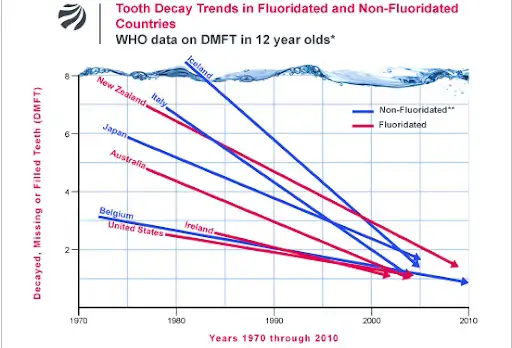Fluoride In Water
Water fluoridation – the vigorously contested mineral in our drinking water
The naturally-occurring mineral fluoride can prevent or reduce tooth decay in small quantities. For this reason, many toothpastes, tooth gels and mouthwashes contain fluoride. In some countries, fluoride is therefore also added to drinking water. This drinking water fluoridation is intended to protect the population from the widespread disease tooth decay and improve the dental health. Until now, there is no nationwide fluoride in water in NZ.
In countries with drinking water fluoridation, various studies have shown that dental cavities in the population has decreased by 50 to 60 per cent. This may be a result of the direct contact of fluoride with tooth enamel. However, opponents of drinking water fluoridation reject the forced medication of the entire population and fear undesirable side effects.

Fluoride in drinking water – important for healthy teeth or toxic for our health?
Even though many studies prove that fluoride is essential for preventing tooth decay, an increasing number shows the opposite. In countries with nationwide water fluoridation, like in the US, too much fluoride can lead to whitish or brownish discolouration of the teeth. Currently, the so-called fluorosis affects around 65 per cent of ages 12 to 15 years – an age range displaying fluorosis most clearly. If the fluoride concentration in the body is too high, fluorosis is not only aesthetically annoying. It is also harmful to dental health, as it weakens the resistance of the tooth enamel.
However, a high fluoride concentration may affect the immune system, blood circulation, respiratory organs, liver and kidneys, and brain functions. Accordingly, the beneficial effects on tooth decay incidence are countered by many toxic and even more unclear modes of action.
Contaminants in your water: Fluoride
What is Fluoride and where to find it?
Fluoride is a natural mineral(1) that occurs in various rock layers of the earth’s crust. It is also found in most foods, but only in minimal amounts. Sources include sea fish like sardines and black tea. In addition, cereals, liver and meat contribute to the supply of fluoride. Moreover, (drinking) water naturally contains fluoride. However, the amount of fluoride in drinking water can vary significantly from region to region. The trace element fluoride is found in the body, primarily in bones and teeth, and, along with other minerals, ensures the strength of these structures.
In the early 20th century, scientists found a link between naturally occurring fluoride levels in water supplies and low tooth decay incidence in these regions. As a result, in 1945, the U.S. became the first country(2) to artificially add fluoride to its drinking water to improve dental health among its population. Two decades later, fluoride became an additive in toothpaste around the world.


Fluoride in water NZ
As a trace element, fluoride(3) is found everywhere in the environment, such as in our tap water. Fluoride is not essential for humans, but it can prevent tooth decay and repair damage to tooth enamel in small amounts. For this reason, fluoride is artificially added to drinking water in various countries around the world, for example, in the United States, Australia and parts of New Zealand. However, most European countries do not add fluoride to their drinking wate.
In New Zealand, the Health (Fluoridation of Drinking Water) Amendment Act 2021, commenced in December 20121, transferred the responsibility to the Director-General of Health. However, this does not affect private water supplies, where drinking water does not have to be fluoridated.
Controversial studies on the decline of tooth decay
According to most recent studies(5), adding fluoride to drinking water is harmless and effective, decreasing dental caries. However, a counter-study by Harvard University(2) points out that tooth decay cases have also declined in many countries that do not fluoridate their drinking water.
At the moment, several councils have added fluoride to their drinking water, like Auckland and the whole North Shore with Orewa, Albany and Silverdale. Currently, the municipal drinking water supplies of Warkworth, Snells Beach, Algies Bay, Kaiwaka and Welsford do not contain artificially added fluoride. However, with New Zealand’s legislation changes in 2021, the Director-General of Health has control over directing local authorities to fluoridate the water supplies.
Footnotes on Contaminant in your water: Fluorie
It is your choice: fluoride in water NZ
At Aqua Works, our customers often ask our service team to remove contaminants such as fluoride or chlorine from drinking water. We have the solution: with Reverse Osmosis, we guarantee fluoride-free drinking water from your kitchen tap.
Fluoride and dental health care
Tooth protection with fluoride in water NZ
Fluorides are good for the teeth – that is what scientists, health advisors and dentists have been saying for decades. Therefore, fluoride has become an indispensable part of our dental hygiene. Fluorides(1), which get onto the teeth via toothpaste, a fluoride-containing gel or mouthwash, form a protective film around the teeth. Consequently, it makes them less susceptible to bacteria and reduces the risk of tooth decay(2). Fluoride contributes to our dental health in three ways. For this reason, almost every toothpaste advertises that it contains fluoride.
First(1), fluoride has an antibacterial effect. It fights bacteria in tooth enamel, reducing their production of harmful acids, leading to tooth decay. Sodium monofluorophosphate, sodium fluoride, and amine fluoride have proven to be particularly effective in their antibacterial action.
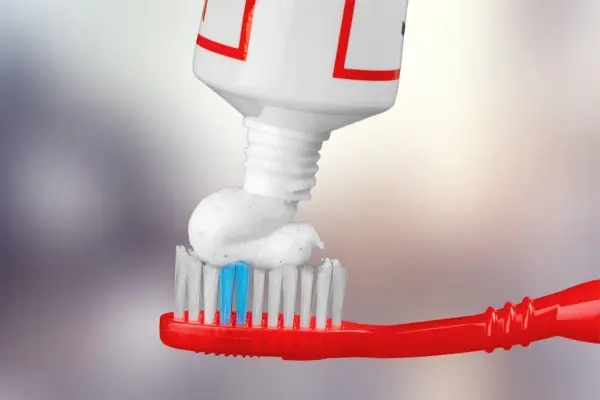

Dental health with fluoride in water NZ
Secondly(1), it leads to the hardening of tooth enamel. Fluoride also helps harden tooth enamel, making it more resistant to acid attacks. In particular, when a new tooth breaks through the oral cavity, it absorbs minerals from saliva to build up the enamel. The fluoride ions are also absorbed and integrated into the enamel, making it more resistant and stable.
Finally(1), it contributes to the mineralization of the enamel. When acids attack the enamel, it consistently loses certain mineral salts. This mineral loss is compensated by calcium and phosphate ions from saliva. Fluoride dissolves these ions from the saliva and thus makes them available for the remineralization of the tooth enamel in the first place. Without fluoride, the rebuilding process would not be as effective.
Footnotes on Fluoride and dental health care
Fluoride in toothpaste but not in your drinking water
If you want to make sure that you yourself decide about the amount of fluoride you want to ingest, we have a solution for you. With an appropriate filter technology we eliminate the fluoride from your drinking water.
Health effects by fluoride in water NZ
Adverse effects of excessive fluoride intake
Acute poisoning(1) with high amounts of fluoride may cause nausea, vomiting, abdominal pain, diarrhoea and cramps. However, adverse effects of long-term excessive fluoride intake(2) mainly affect the skeleton (skeletal fluorosis or increased susceptibility to fractures) and the teeth (dental fluorosis). In addition, there is a growing body of research linking other serious diseases, such as diabetes or brain damage, to long-term fluoride intake.
Fluorides and the teeth
While fluoride in a dosage of about 1 mg/day is considered an effective means of tooth decay prophylaxis (fluoridation), it produces dental fluorosis(3) in higher doses. Dental fluorosis(5) occurs when too much fluoride is regularly available to the teeth – especially during tooth development. At that time, the production of the tooth enamel, which has the task of protecting the tooth from damaging external influences, is disturbed. White to brown discolourations form in the form of spots or streaks on the enamel surface (“Colorado Brown Stain” or “Texas Teeth”). However, it is aesthetically annoying and harmful to the teeth in more severe cases, as the enamel surface becomes less resistant.
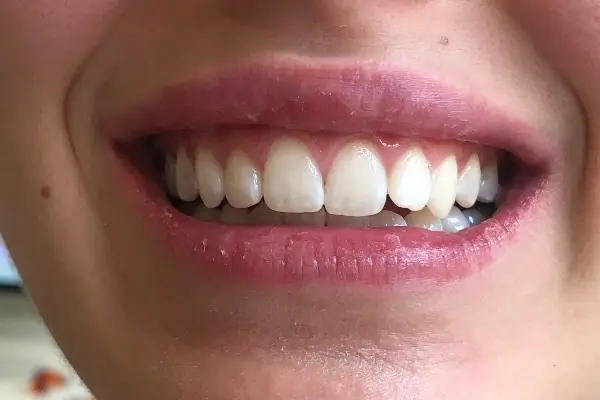
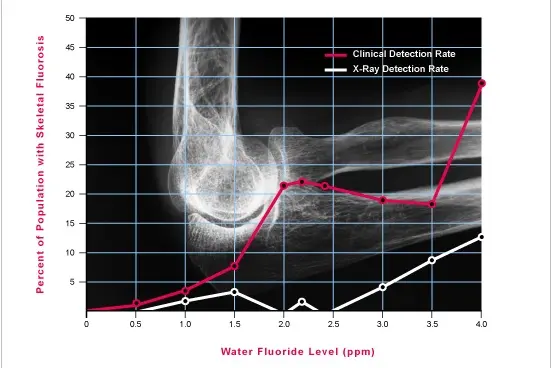
Fluorides and the bones (skeleton)
Long-term excessive fluoride intake can result in the undesirable effect of skeletal fluorosis(4). This describes the storage of fluoride in the bones associated with an increase in bone density. Due to this increase in bone density, it loses its elasticity, and the bone becomes less resilient and more brittle. Under certain circumstances, not only the joints but the entire spine stiffens. In the beginning, skeletal fluorosis is asymptomatic and only visible on X-rays. With increasing fluoride incorporation into the bones due to increased intake, the pain of the joints develops up to stiffness and calcification. Thus, fluoride plays a unique role in the risk of bone fractures.
Fluorides and diabetes
According to the National Research Council (2006), “Fluoride exposure may play a significant role in disrupting glucose metabolism and in the development of diabetes.” Fluorides are thought to increase blood glucose levels, promote insulin resistance in cells, and further inhibit insulin production and secretion. In response to elevated blood glucose levels and a higher frequency of urination, people with diabetes drink significantly more water than non-diabetics, which is why they also ingest more fluorides from drinking water and other beverages on a daily average than healthy people. Increasing exposure and retention of fluoride is why people with diabetes are at higher risk for fluoride poisoning.


Fluorides and the brain
The harmful effects of fluorides on the brain are among the most critical areas in fluoride research today. Over the past three decades, more than 100 studies have shown that fluoride exposure can damage the brain. Animal and human studies have shown that moderate amounts of fluoride can reduce intelligence, lower learning ability, and poorer memory. In light of these numerous research findings, several reviews – including one authored by the U.S. National Research Council (6) and a meta-analysis published by a team of researchers at Harvard (3) – concluded that even low levels of fluoride had the potential to impair brain development severely.
Footnotes on Health Effects by Fluoride in water
Aqua Works can remove fluoride in water NZ
Reverse Osmosis is a well-established water filtration technology to eliminate unwanted impurities from your water. Talk to our expert team to find out which option is the best for your indivudial needs.
Fluoride in water NZ: it is your choice
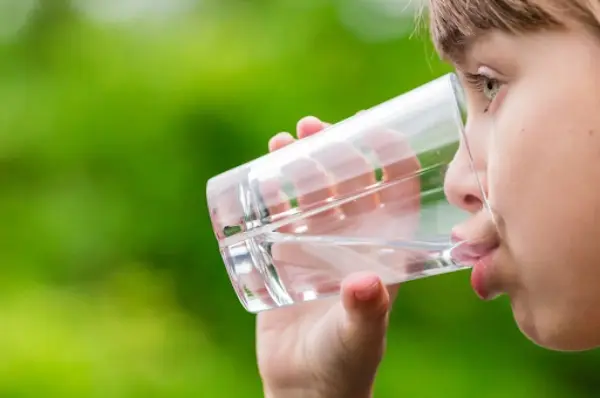
Fluoride in your drinking water
The bottom line is, fluoride is considered indispensable in dentistry. Numerous studies show that it has a positive effect on tooth development. If it is present in sufficient quantities in toothpaste, it prevents tooth decay and hardens the tooth enamel. In addition to regular brushing, fluoride makes a significant contribution to tooth preservation. However, do we need to add it to our drinking water so that it can enter the bloodstream and possibly the brain? The minerals can be deposited in brain tissue and affect neurotransmitters(1). There they affect development(2), especially in the unborn.
Call us today at 0800 AQUA UV to schedule an on-site appointment for our expert service team to get your drinking water tested.
Reverse Osmosis for Fluoride in water NZ
The water filters of a reverse osmosis (RO) system work according to the physical principle of reverse osmosis. Water is pressed through a very fine membrane at high pressure, separating into osmosis and wastewater. Reverse osmosis is a reliable method to remove fluoride and other contaminants from your tap water. Using a reverse osmosis system in your household gives you the full assurance that your water is free of pollutants and safe to drink.
The reverse osmosis system is installed under your kitchen bench. Aqua Works offers various underbench Reverse Osmosis filter options with multiple flow rates and different technologies types. Our service team will come on-site and look at the conditions in your kitchen. Together we decide which product technology is the best suitable for your individual needs.

Footnotes on Fluoride in Water NZ: It is your choice.
Water is the elixir of life and our passion

Exceptional support for our water filtration customers
20+ years of experience in Rodney means Aqua Works is your local water filtration expert. Our knowledge of the community and the region we live in, combined with our passion for clean drinking water, is the foundation for our daily work. We offer customised water solutions supporting you to meet your personal needs and individual budget. Our connected, smart product range enables you to master the water in your home. At the same time, it ensures the best purification of your water for healthy, tasty water enjoyment.
As a purpose-driven, local family business, we support you in your decision making by sharing our knowledge about your water resources. This way, we help you to be informed, so you can make great decisions empowering your families health and well being. The protection and provision of safe, potable drinking water in our lives is paramount to all of us. Aqua Work’s water filtration systems, UV filter purification, water treatment, ozone systems, and water pumps give you peace of mind to have a quality trusted, safe system.
Going the extra mile at Aqua Works is what we do to ensure your water is healthy and fit for its purpose. Hence, all our water treatment products are field tried-and-tested, including innovative products and solutions. Do you need help with UV filters, water filtration systems and water pumps or our high-quality UV filter service, water pump repairs or water pump service? Give us a call today at 0800 AQUA WORKS. As we often say, “If you don’t have a filter – You are the filter”.
And if something happens spontaneously, call our 24/7 water pump emergency service at 0212 787 427. We will take care of your problem immediately and make sure that the water in your home is running again as quickly as possible.

